Senate Bill Would Create Texas Grid Security Commission
By Keaton Peters
Reporting Texas
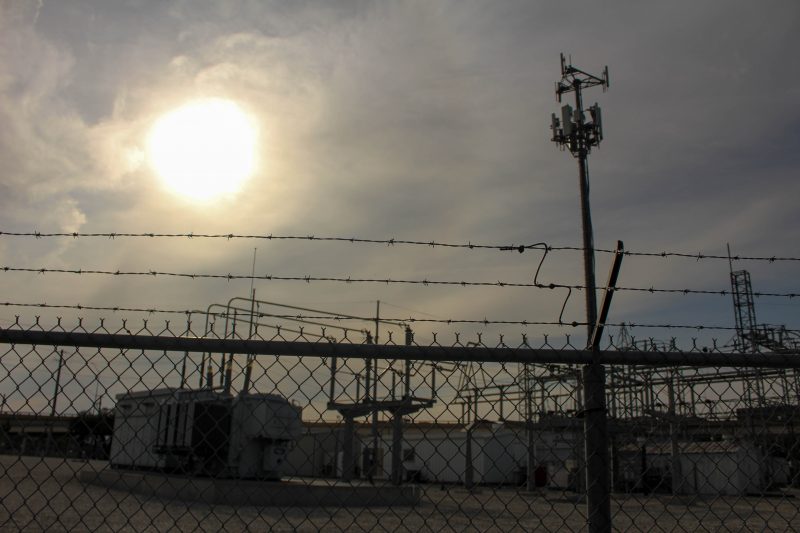
Barbed wire protects a Central Austin energy substation in February, 2023. The biggest threat, however, may be from the sun which can cause an electromagnetic pulse that damages the state’s electrical grid. Maya Wray/Reporting Texas
When Sen. Bob Hall, R-Edgewood, first introduced legislation aimed at protecting Texas’ electric grid against damage caused by electromagnetic pulses, his colleagues in the Texas Senate gave him a real tin foil hat.
“When I first started, there was nobody in this Capitol that could spell EMP (electromagnetic pulse). They’d look at me like I was crazy when I kept talking about it,” Hall told Reporting Texas.
An EMP is an invisible, powerful burst of electromagnetic energy that could be generated by a high-altitude nuclear blast or by powerful storms originating on the sun and reaching the Earth, said Jim Platt, the Acting Associate Director for Planning and Coordination within the National Risk Management Center. EMP’s can potentially cause severe damage to electronics and the country’s aging electric grid. While many experts say the likelihood of a nuclear bomb EMP attack is unlikely, a naturally occuring EMP event from a solar storm is less so.
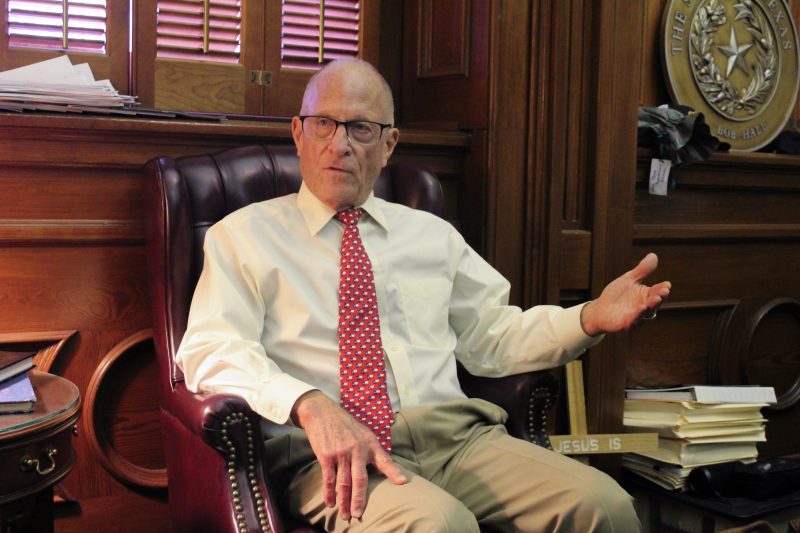
Texas State Sen. Bob Hall, R-Edgewood, discusses his bill to evaluate the security of Texas’ power grid at the Texas Capitol on Feb. 23, 2023. Hall had previously warned lawmakers of problems within the grid before Winter Storm Uri in 2021. He has since advocated for assessments and improvements to the grid. Maya Wray/Reporting Texas
Following 2021’s Winter Storm Uri, which brought freezing temperatures and knocked out electricity to millions of Texans, more of Hall’s legislative colleagues were open to listening to how he wanted to strengthen the grid, he said.
“Without electricity, life comes to an end,” Hall said. “It’s bad enough as we learned in Uri if it’s out for a few days.”
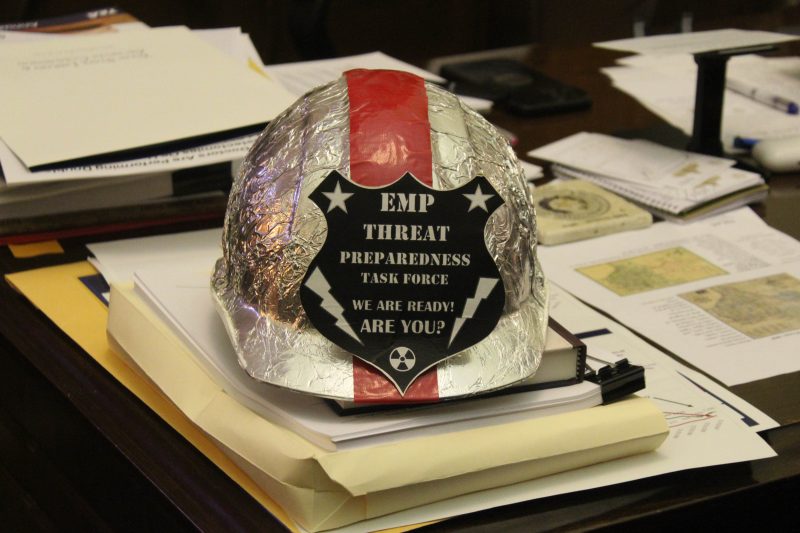
A tinfoil hat given to Sen. Bob Hall by Republican colleagues sits on his desk at the Capitol. Initially criticized for his concerns about the Texas grid, Hall is working to pass a bill creating a security commission focused on protecting the state’s ability to generate power. Maya Wray/Reporting Texas
This time around, Hall has packaged EMP preparedness into a larger bill that would create a Texas Grid Security Commission to assess and improve the state electrical grid’s ability to withstand direct physical attacks, earthquakes, extreme weather, cyberattacks and rare but consequential events like an EMP.
Senate Bill 330 has 25 sponsors across party lines in the 31-member Texas Senate, where it has yet to be voted on by the full Senate. If it becomes law, SB 330 will bring together members of the military and officers from state agencies who oversee emergency response and risk management, the electric grid and the oil and gas industry.
The commission will develop standards “to ensure that energy, electric power, and fuel supplies are protected and readily available for recovery in the event of a severe outage,” said a spokesperson for Senator Sarah Eckhardt, D-Austin, who is a sponsor of the bill.
The Texas Grid Security Commission’s new standards would help ensure power comes back on as quickly as possible in the case of an outage, Hall said.
Rather than having enforcement power of its own, the Texas Grid Security Commission would rely on the regulatory power of the Texas Railroad Commission, which regulates the oil and gas industry in Texas. Companies that the Railroad Commission determines “operate critical components of the ERCOT electric grid” would be required to display on a public website whether they are in compliance with the grid security commission’s standards. The Railroad Commission could issue administrative fees to companies that do not comply with standards.
SB 330 also would require the new grid security commission to “prepare and deliver a report to the legislature on the progress of implementing resilience standards,” before the start of 2025.
The security of Texas’ electric grid is already monitored by the Electric Reliability Corporation of Texas, which energy consultant Doug Lewin described as the “air traffic controller” of the grid.
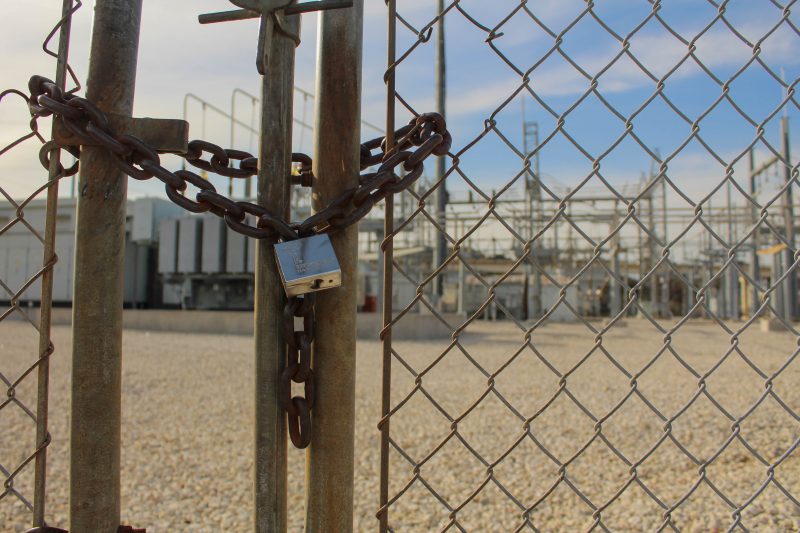
A lock and rusted chain secure an Austin energy substation in February, 2023. Grid security has recently become a more pressing concern following Winter Storm Uri which partially shut down Texas’ ability to generate power. Maya Wray/Reporting Texas
“Whether the threat is cyber or physical, ERCOT continually invests in trained staff and resources to help keep the electric grid safe,” according to ERCOT’s website.
The Public Utility Commission of Texas also oversees aspects of grid security. “The PUCT works closely with ERCOT, industry, and partner agencies at the local, state and federal levels to coordinate and guard against security threats,” PUCT Press Officer Ellie Breed said.
Hall, however, believes more needs to be done to protect the grid. “The PUC’s got it hands full right now just overseeing utilities out there, and ERCOT is busy making it all work.”
Neither ERCOT nor the PUCT responded to specific questions about how the agencies safeguard the grid against EPMs, which are Senator Hall’s primary concern.
Hollywood has portrayed a nuclear EMP as a bomb attack detonating in the atmosphere frying electronic devices and knocking out the entire electric grid in the United States, said but that’s not likely to happen, said Platt, who spent a good portion of his career studying electromagnetic pulses and risk management of critical infrastructure.
A nuclear EMP is more likely to fry smaller electronic devices, while an EMP from a storm generated by the sun — also known as a coronal mass ejection — could potentially damage electricity transmission equipment on the grid.
The most famous coronal mass, called the Carrington Event, took place in 1859 before electricity use was widespread. It caused extensive damage to telegraph equipment. “We are going to have strong geomagnetic storms that will have impacts on the grid. How strong they will be is up for debate,” Platt said.
Coronal mass ejections are more likely when there is “more solar activity taking place,” which is happening now, as we approach a solar maximum in 2025 when the risk of an EMP from intense solar storms will be heightened, Platt said.
To protect the grid, electric grid control centers can be “hardened” to better withstand an EMP, Hall said. While SB 330 does not specify how to strengthen the grid, it would give the new grid security commision “power to define what can be done and what must be done to our grid system to ensure survivability,” Hall said.
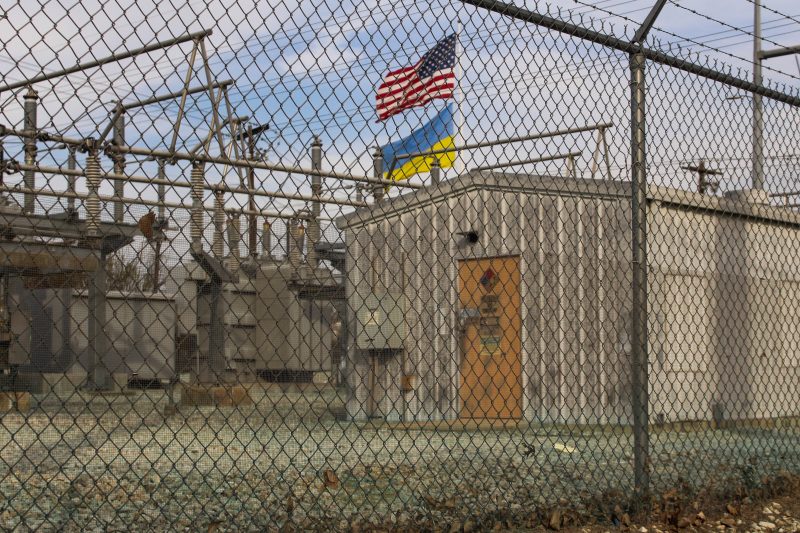
An American flag flies above a Ukrainian flag near Austin’s Steck Substation on Feb. 18, 2023. Ukraine’s power grid suffered severe damage after Russian attacks in late 2022. Security concerns over physical attacks to the U.S. power grid rose around that time, especially after substations in North Carolina, Oregon and Washington were attacked in early 2023. Maya Wray/Reporting Texas
Federal officials including Platt are already looking at how to best strengthen the grid against an EMP, and paying close attention to cyberattacks as well as a rise in physical attacks by extremist groups intending to cause chaos by knocking out power.
The Department of Energy is one of the leading federal agencies overseeing electrical grid security in partnership with law enforcement, the intelligence community and electric utilities.
“A core component in the partnership between industry and government is continuous information sharing,” a spokesperson for the Department of Energy said.
Platt said he hopes Texas will partner with the National Risk Management Center in order to “have unity of efforts, unity of messaging and make sure we are not duplicating efforts.”
The Texas Grid Security Commission would not include any representatives from relevant federal agencies, but it would include a representative from the office of State-Federal relations, various state agencies and experts on the Texas grid.
Hall hopes to pass SB 330 this session, and once the grid security commission has created new standards, he thinks it will be necessary to enhance the enforcement power of the commission at a future legislative session.
“Trying to dictate an implementation at this point when we don’t even know exactly what the implementation would be, would be premature,” Hall said.
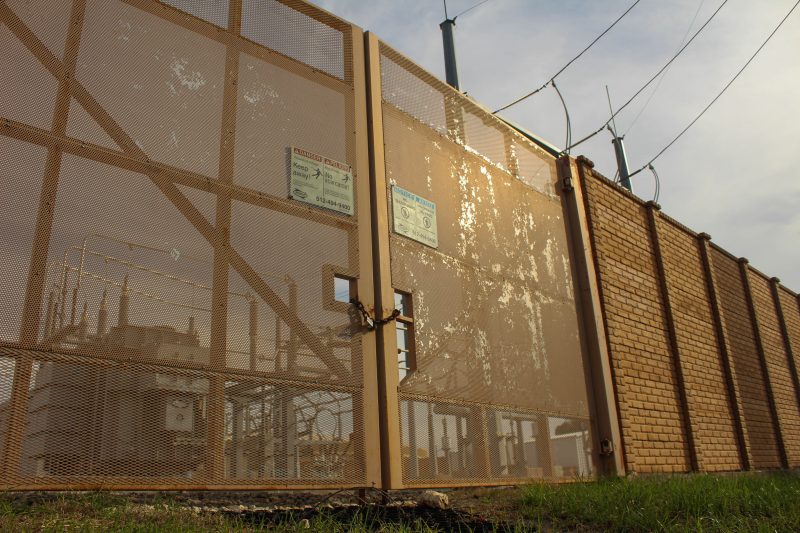
A brick wall and padlocked doors protect an Austin energy substation near the University of Texas at Austin campus. Maya Wray/Reporting Texas
Hall’s first priority is to simply get SB 330 passed, which is no guarantee. Despite bipartisan support in the Texas Senate, Hall is unsure whether he will have the support of Gov. Greg Abbott or Lt. Gov. Dan Patrick, saying neither had spoken to him about the bill. Abbott and Patrick did not respond to requests for comment from Reporting Texas.
Despite the lack of dialogue with the governor and lieutenant governor, Hall remains steadfast.
“The purpose of government is to protect the people,” Hall said. “This is something that the government needs to be doing.”